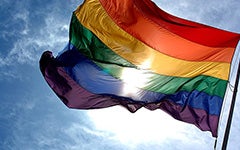
Each June, communities around the nation come together to commemorate the 1969 Stonewall riots in New York during LGBTQ History Month, commonly called Pride Month. The Library has a diversity of resources that can help you explore LGBTQ stories, history, and issues. Subject Specialist Megan Browndorf has put together some of her top recommendations of books, e-resources, and streaming media available through the Library for you to check out this month!
Books
These works of fiction are just a few of a wide variety of LGBTQ stories that can be found on our shelves.
- House of Impossible Beauties, Joseph Cassara: A gritty and gorgeous debut that follows a cast of gay and transgender club kids navigating the Harlem ball scene of the 80s and 90s, inspired by the real House of Xtravaganza made famous by the seminal documentary Paris is Burning.
- The days of Anna Madrigal: a novel, Armistead Maupin: Follows ninety-two-year-old Anna Madrigal, the legendary transgender landlady of 28 Barbary Lane, as she joins her former tenant Brian on a road trip to Nevada where she attends to unfinished business she has long avoided.
- Black Deutschland, Darryl Pickney: Jed—young, gay, black, out of rehab and out of prospects in his hometown of Chicago—flees to the city of his fantasies, a museum of modernism and decadence: Berlin.
E-Resources
These databases are a great jumping off point for exploring the history of LGBTQ movements nationwide and locally in the DC metro area.
- Archives of Sexuality & Gender: LGBTQ History and Culture since 1940: Over 1 million pages of newspapers, periodicals, government reports, and more on LGBTQ activism, culture, organizations, and more. Coverage ranges from the 1940s to 2014. Part of Gale Primary Sources Online.
- Phyllis Lyon, Del Martin and the Daughters of Bilitis: Del Martin and Phyllis Lyon founded the Daughters of Bilitis in 1955, the first organization dedicated to lesbian rights in the United States. The collection includes organizational documents, DOB's monthly magazine The Ladder, and correspondence from women across America. Part of Archives Unbound.
- Washington Blade, 1969-1989: The Washington Blade has been Washington, D.C.’s principal lesbian, gay, bisexual and transgender (LGBT) newspaper since its first issue in October 1969. It began as a monthly news sheet and a replacement for the Mattachine Society of Washington’s newsletter of the 1950s and early 1960s. The Blade quickly grew, adding images and additional pages, and expanding its run to twice a month, and then weekly. The Blade covered current events from an LGBT perspective as well as LGBT life in D.C. and the social and political progress of the gay rights movement.
Streaming Media
The Library has a number of streaming media platforms, including Academic Video Online, and Films on Demand that feature documentary films on LGBTQ issues and experiences.
- Stonewall Uprising, PBS: In this 90-minute film, AMERICAN EXPERIENCE draws upon eyewitness accounts and rare archival material to bring this pivotal event to life. Based on David Carter's critically acclaimed book, Stonewall: The Riots that Sparked the Gay Revolution, Stonewall Uprising was produced by Kate Davis and David Heilbroner.
- (A)sexual, directed by Angela Tucker: This groundbreaking film introduces viewers to men and women who have never experienced sexual attraction. In 2000, David Jay came out as asexual to his parents. In this film he shows that he is not alone; studies show that as much as one percent of the population may be asexual.
- Global Gay: Whether it be regarding legalization in the Middle East and Africa or the focus of gay marriage laws in the West, after years of long diplomatic struggle, several world leaders have declared themselves in favor of the universal decriminalization of homosexuality. But victory won’t come easily. The countries that still punish homosexuality refuse to give in to international pressure. This film follows this battle for decriminalization through the lives and work of some of its fearless pioneers in Russia, Cuba, Cameroon, Nepal, and South Africa.
